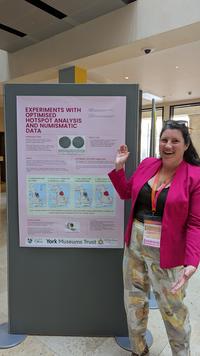Lucy Moore is a Postgraduate Research student at the University of York and was awarded a bursary to attend this year's Digital Humanities Oxford Summer School and wrote this blog post about her experience. To find out more about this year's bursaries see here. To join the mailing list and learn about the next summer school sign up here.
I came to the Digital Humanities at Oxford Summer School wearing three different hats: my PhD, my practitioner and my volunteer hats! My PhD research looks at early medieval numismatics, in particular analysis of ninth-century coinage from the former kingdom of Northumbria. Furthering this research was a key motivation for joining the summer school - I use ArcGIS already, but lots of other approaches to my data had been suggested (network analysis) and I wanted an opportunity to test them out in a taught environment. However, I am not just my PhD and I felt my curatorial work for Leeds Museums & Galleries would benefit too. I’m currently thinking about digital approaches to collecting sporting heritage with my job-share. As a volunteer in the Wikimedia movement, I also felt this perspective would be a strong addition to the summer school, bringing experiences based on my involvement with the community both in the UK and globally.
Despite all these interests I was a bit nervous about attending: would I be digital enough and of course the classic would I ask a question and get derided? Luckily these doubts were unfounded, with one of the friendliest and most welcoming events I’ve been to. People were happy to chat from day one and the speed-networking on day two broke the ice for lots and lots of us.
The summer school was divided into a range of strands, and I placed myself within the Humanities Data cohort. The focus here was to learn about a range of tools and to test them out with our data and ideas. We started the week thinking about data, ethics and evaluation, and as the week went on looked more closely at a range of key principles. What I really valued was the emphasis that data is always biased, and that key to good digital humanities work is recognising these biases and being explicit about them. I think we all kind of know this, but it was really great to discuss this kind of subjectivity openly and with people who’d also been thinking about it (often for decades).
There were also opportunities for us to share our research: I got involved with both the poster session, and presenting at the Humanities Data Miscellany. For my poster I wanted to use it as an opportunity to start some discussion with people who work on ArcGIS and to discuss the optimised hotspot analysis tool in more detail, which it turned out was a fairly niche audience! Nevertheless I got to practise explaining this aspect of my research to lots of people, and more generally introduce them to the joys of working with numismatic data.

Lucy Moore with her poster from the poster reception at the Weston Library
For the Humanities Data Miscellany I wanted to share a little on my Wikimedia volunteering, partly because I was curious about what the group would think. I chose to discuss my editing on cultural heritage institutions in Oceania - all about using Wikipedia to raise awareness of them - and then closed by linking to a recent article about how Tuvalu was thinking about how it could be a digital only country due to the climate crisis.
We also had a range of keynote speakers, discussing their research and future agendas for digital humanities. I loved the focus on the fragility of digital community archiving from Lorna Hughes. Oonagh Murphy really enlightened me on the ways that museums are already experimenting with AI, as well David de Roure’s lecture which led to questions about the extent to which an AI can replicate an imagination. I think more space could have been created to consider digital colonialism more widely. Lots of focus was on English-language-centric initiatives and research and it would have been really beneficial for some of these projects to be considered from decolonial perspectives, especially since there were summer school attendees from every continent. Plus how can we critique the tools and practices we develop without hearing from a wider group of users than those who create them?
The summer school took place at Keble College, Oxford. Say what you like about Oxford, colleges make great settings, and the staff there were really fantastic, serving lovely meals and keeping the rooms and gardens welcoming and bright. There’s a full thread of my experience on twitter - you can find it here. To support me to attend I received a bursary from the summer school organisers, for which I am very grateful. Thanks also go to my brother, who put me up in his house for the week!